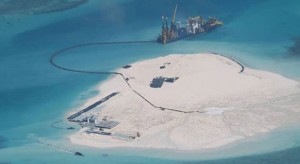‘China’s refusal to join arbitration a serious violation of Unclos’

Johnson Reef, called Mabini by the Philippines, at the Spratly Islands in the West Philippine Sea. AP FILE PHOTO
MANILA, Philippines—China’s snub of the Philippine arbitral claim on the West Philippine Sea and the slew of building projects initiated by Beijing on disputed reefs in the area are “a serious and belligerent violation” of the UN Convention on the Law of the Sea (Unclos), a Filipino lawyer and international legal expert told a conference in Tokyo last week.
Speaking at the fifth annual meeting of the Japan Society of International Law at the Chuo University Law School, Harry Roque Jr. said that being a signatory to the Unclos, China “agreed to refer all matters involving interpretation and application of the Unclos to the compulsory and binding dispute settlement procedure of the convention.”
Roque, who is also director of the University of the Philippines-Law Center’s Institute of international Legal Studies, recalled that the international community took a very long time to agree on the provisions of Unclos because all countries of the world wanted the convention to be the “constitution for the seas.”
“By prohibiting reservations and by adopting all provision on the basis of consensus, it was the intention of the world community to do away with the use of force and unilateral acts in the resolution of all disputes arising from maritime territory,” Roque said in a statement posted on his blog.
Roque also debunked the view expressed recently by Judge Xue Hanquin, the Chinese judge in the International Court of Justice who said that states that made declarations when they ratified the Unclos—China included—were deemed to have opted out of the dispute settlement procedure of the convention.
He noted that China’s subsequent reservations only to specific subject matters from the jurisdiction of the dispute settlement procedures proves that China agreed to be bound by the procedure.
Roque also said it would not do China any good if reports were confirmed it has been building artificial islands in Mabini (Johnson South) Reef and expanding its artificial island at Kagitingan (Fiery Cross) Reef, and deploying its naval forces to ward off any opposition.
‘Nine-dash line’ illegal
The Philippine government has asked the International Tribunal on the Law of the Sea (Itlos) to declare that China’s “nine-dash line” maritime boundary was illegal since it was not sanctioned by the Unclos.
The Philippines also asked the Netherlands-based arbitral tribunal to declare that Panganiban (Mischief), McKennan, Burgos (Gaven) and Zamora (Subi) reefs—four “low-water elevations,” so-called because they are only visible during low tide, and where China has build artificial islands—be declared as part of the continental shelf of the Philippines.
The Philippines also wanted the Itlos to declare that the waters outside the 12 nautical miles of Panatag (Scarborough) Shoal be declared as part of the Philippine exclusive economic zone.
According to Roque, the Chinese academic in the conference, professor Zhang Xinjun of Tsinghua University, characterized the Philippine arbitral claim as a “mixed claim” because it involved both claims to sovereignty arising from land territory and not just purely maritime territory.
This is why Beijing maintains that the arbitral tribunal lacked jurisdiction over the Philippine claim, Roque quoted Zhang as saying.
The UP professor, however, said the three specific prayers of the Philippines involved interpretation and application of specific Unclos provisions relating to internal waters, territorial sea, exclusive economic zones, islands and low-tide elevations.
RELATED STORIES
UNCLOS explained: Why China’s claims in South China Sea are invalid
China’s military base in PH territory must absolutely be blocked
For comprehensive coverage, in-depth analysis, visit our special page for West Philippine Sea updates. Stay informed with articles, videos, and expert opinions.